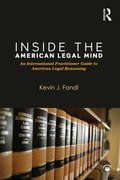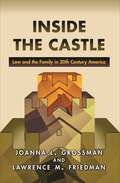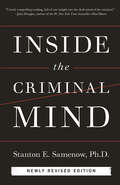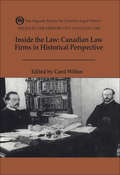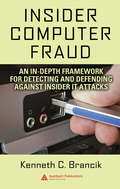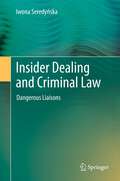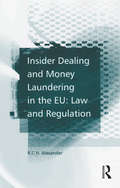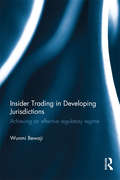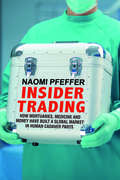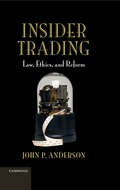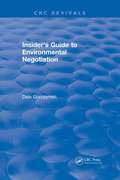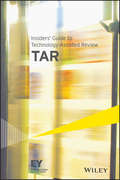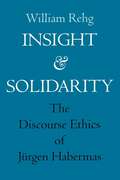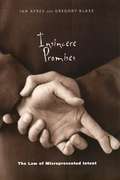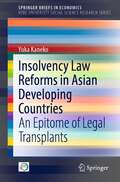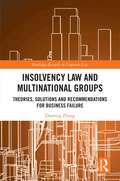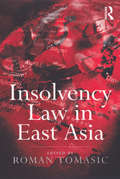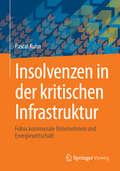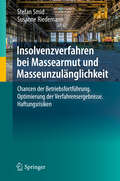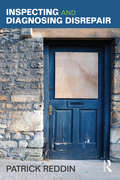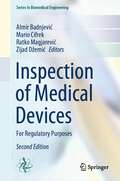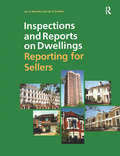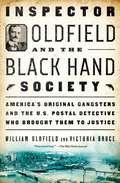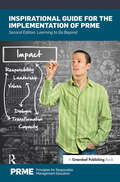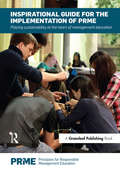- Table View
- List View
Inside the American Legal Mind: An International Practitioner Guide to American Legal Reasoning
by Kevin J. FandlInside the American Legal Mind:An International Practitioner Guide to American Legal Reasoning clearly explains how to navigate within U.S. legal practice. A combination of common law legal history with the straight-shooting American style has resulted in an approach to issue analysis that is structurally different from other fields and from the civil law systems common in other countries. Precedent drives the interpretive process, providing the pillars upon which an American lawyer builds a case. Understanding how to capture relevant aspects of precedent, merge those aspects with precedent from seemingly distinct cases, and apply the resulting formula to a given fact pattern can be a harrowing experience for anyone untrained in American legal thinking. This book bridges that gap for aspiring lawyers in America as well as for foreign legal practitioners. Fandl clearly and concisely demonstrates how to research, analyze, and ultimately condense legal ideas into written form in the American legal style. Suitable for undergraduates in U.S. Criminal Justice programs and for LL.M. courses, as well as for continuing education for professionals.
Inside the Castle: Law and the Family in 20th Century America
by Lawrence M. Friedman Joanna L. GrossmanA comprehensive social history of families and family law in twentieth-century AmericaInside the Castle is a comprehensive social history of twentieth-century family law in the United States. Joanna Grossman and Lawrence Friedman show how vast, oceanic changes in society have reshaped and reconstituted the American family. Women and children have gained rights and powers, and novel forms of family life have emerged. The family has more or less dissolved into a collection of independent individuals with their own wants, desires, and goals. Modern family law, as always, reflects the brute social and cultural facts of family life.The story of family law in the twentieth century is complex. This was the century that said goodbye to common-law marriage and breach-of-promise lawsuits. This was the century, too, of the sexual revolution and women's liberation, of gay rights and cohabitation. Marriage lost its powerful monopoly over legitimate sexual behavior. Couples who lived together without marriage now had certain rights. Gay marriage became legal in a handful of jurisdictions. By the end of the century, no state still prohibited same-sex behavior. Children in many states could legally have two mothers or two fathers. No-fault divorce became cheap and easy. And illegitimacy lost most of its social and legal stigma. These changes were not smooth or linear—all met with resistance and provoked a certain amount of backlash. Families took many forms, some of them new and different, and though buffeted by the winds of change, the family persisted as a central institution in society. Inside the Castle tells the story of that institution, exploring the ways in which law tried to penetrate and control this most mysterious realm of personal life.
Inside the Criminal Mind: Revised and Updated Edition
by Stanton SamenowLong-held myths defining the sources of and cures for crime are shattered in this ground-breaking book--and a chilling profile of today's criminal emerges.
Inside the Law: Canadian Law Firms in Historical Perspective
by Carol WiltonLaw firms are important economic institutions in this country: they collect hundreds of millions of dollars annually in fees, they order the affairs of businesses and of many government agencies, and their members include some of the most influential Canadians. Some firms have a history stretching back nearly two hundred years, and many are over a century old. Yet the history of law firms in Canada has remained largely unknown. This collection of essays, Volume VII in the Osgoode Society's series of Essays in the History of Canadian Law, is the first focused study of a variety of law firms and how they have evolved over a century and a half, from the golden age of the sole practitioner in the pre-industrial era to the recent rise of the mega-firm. The volume as a whole is an exploration of the impact of economic and social change on law-firm culture and organization. The introduction by Carol Wilton provides a chronological overview of Canadian law-firm evolution and emphasizes the distinctiveness of Canadian law-firm history.
Insider Computer Fraud: An In-depth Framework for Detecting and Defending against Insider IT Attacks
by Kenneth BrancikAn organization‘s employees are often more intimate with its computer system than anyone else. Many also have access to sensitive information regarding the company and its customers. This makes employees prime candidates for sabotaging a system if they become disgruntled or for selling privileged information if they become greedy. Insider Comput
Insider Dealing and Criminal Law
by Iwona SeredyńskaThis work is a multidisciplinary analysis of the issue of insider dealing from the perspective of the applicability of criminal law to regulate it. First, it examines the nature of its prohibition in the European Union and in the United States of America. The text includes a more extensive overview of prohibition in four Member States of the European Union (France, the United Kingdom, Luxembourg and Poland). Then, it summarises the arguments presented by ethicists and economists in favour of and against insider dealing. Further, it analyses the foundations of criminal law and justifications that are given for its application. On the basis of this analysis, it presents a new two-step theory of criminalisation. The first step is based on a liberal theory of wrongfulness that makes reference to protection of the basic human rights. The second step relies on classical but often forgotten principles of criminal law. Finally, it examines possible alternatives to criminal rules.
Insider Dealing and Money Laundering in the EU: Law And Regulation (ep
by R.C.H. AlexanderThis work presents a comparative study of the provisions relating to insider dealing under the EC Insider Dealing Directive. The volume begins with a discussion of the rationale for regulating financial services in general and controlling insider dealing and money-laundering in particular. It examines the definition of an insider and of inside information and the various criminal offenses relating to insider dealing. The role of money-laundering is also recognized and the anti-money laundering regime as well as the considerable impact on the financial sector is discussed in detail. The work assesses the efficacy of criminal law in controlling insider dealing and considers the increasing trend to deal with it by means of civil/administrative measures.
Insider Trading in Developing Jurisdictions: Achieving an effective regulatory regime
by Wunmi BewajiThe book examines the regulation of insider dealing in the developed jurisdictions, using three of the G7 countries as guides with the aim of knowing how they have regulated insider trading and what lessons can be learnt from their failures and achievements. It looks at regulatory regimes in the US, the UK and Japan in order to consider whether these regimes can be successfully transplanted to developing countries. In order to explore insider dealing in the developing world the book focuses on Nigeria, Africa’s most populous nation and second largest economy. This book examines in theoretical and empirical terms the law on insider trading away from the dogmatic approach of Western literature by presenting the subject from the prism of a developing jurisdiction in post-colonial Africa with a divergent cultural, historical, social, political and economic background. The author analyses what shape insider dealing takes in Nigeria, a predominantly illiterate society, and considers the groups involved. The books also explores how the concept of insider dealing regulation is understood amongst parties integral to its administration and enforcement such as lawyers, judges, stockbrokers, and ordinary investors. The legislation governing insider dealing regulation in Nigeria is critically examined to expose its strengths and weaknesses, and to see how foreign provisions and legislation have been incorporated. The book uses Nigerian experiences to consider its implications for other developing nations, arguing that regulatory regimes need to take into account the specific social, political, historical and economic factors of a particular locale rather than importing regulations wholesale from developed jurisdictions.
Insider Trading: How Mortuaries, Medicine and Money Have Built a Global Market in Human Cadaver Parts
by Naomi PfefferThe cadaver industry in Britain and the United States, its processes and profits Except for organ transplantation little is known about the variety of stuff extracted from corpses and repurposed for medicine. A single body might be disassembled to provide hundreds of products for the millions of medical treatments performed each year. Cadaver skin can be used in wound dressings, corneas used to restore sight. Parts may even be used for aesthetic enhancement, such as liquefied skin injections to smooth wrinkles. This book is a history of the nameless corpses from which cadaver stuff is extracted and the entities involved in removing, processing, and distributing it. Pfeffer goes behind the mortuary door to reveal the technical, imaginative, and sometimes underhanded practices that have facilitated the global industry of transforming human fragments into branded convenience products. The dead have no need of cash, but money changes hands at every link of the supply chain. This book refocuses attention away from individual altruism and onto professional and corporate ethics.
Insider Trading: Law, Ethics, And Reform
by John P. AndersonAs long as insider trading has existed, people have been fixated on it. Newspapers give it front page coverage. Cult movies romanticize it. Politicians make or break careers by pillorying, enforcing, and sometimes engaging in it. But, oddly, no one seems to know what's really wrong with insider trading, or - because Congress has never defined it - exactly what it is. This confluence of vehemence and confusion has led to a dysfunctional enforcement regime in the United States that runs counter to its stated goals of efficiency and fairness. In this illuminating book, John P. Anderson summarizes the current state of insider trading law in the US and around the globe. After engaging in a thorough analysis of the practice of insider trading from the normative standpoints of economic efficiency, moral right and wrong, and virtue theory, he offers concrete proposals for much-needed reform.
Insider's Guide to Environmental Negotiation
by Dale GorczynskiA one-of-a-kind book that provides winning strategies from both corporate and environmentalist points of viewInsider's Guide to Environmental Negotiation reflects the author's more than 10 years of experience in environmental negotiation and reveals secrets previously known only to insiders familiar with what is needed to win in this volatile arena. The author has been personally involved in all of today's significant issues, including hazardous waste, environmental health, subsidence and flooding, air quality, and water and wastewater. The book provides critical insight into the negotiation process, both formal and informal, private and public. It also offers valuable tips on techniques, such as using the media to your best advantage and developing effective strategies. This practical, easy-to-read book is invaluable for industry personnel, environmental groups, expert witnesses, government officials, lawyers, lobbyists, consultants, politicians, and anyone else involved in the difficult art of environmental negotiation.
Insiders' Guide to Technology-Assisted Review (TAR)
by Ernst Young LlpUnderstand TAR mechanics, processes, and technologies, as taught by EY experts Insider’s Guide to Technology-Assisted Review provides professionals with a thorough understanding of the process that is becoming increasingly important to the legal industry. With detailed discussion of the methods, technologies, and practices involved in TAR, readers without advanced degrees in linguistics or related technologies will gain a solid knowledge base upon which to evaluate both current practices and the new tools and technology continually hitting the market. Written by the world-renown experts at Ernst & Young’s Technology and Discovery Services, this book provides a valuable resource for professionals seeking a more efficient way to handle the discovery and analysis process. Technology-Assisted Review streamlines the discovery and document review process by essentially “training” a computer to evaluate documents as required. The term “predictive coding” is used in a narrower sense, but both terms have several meanings, and can mean different things to different firms. Insider’s Guide to Technology-Assisted Review cuts through the confusion, differentiating the different types of TAR and explaining the process and mechanics of each. Readers will: Understand the fundamental concepts of technology-assisted review Simplify ediscovery, documentation, and storage of large document sets Learn how TAR tools work, and the resources they require to function Consider the specialized skillset required to fully exploit TAR technology Technology-Assisted Review is here to stay, as the legal industry evolves to take full advantage of the cutting-edge technology becoming more widely available. As TAR becomes standard practice, it’s important for professionals to understand its possibilities and limitations. Insider’s Guide to Technology-Assisted Review provides clear, comprehensive guidance toward this complex topic.
Insight and Solidarity: The Discourse Ethics of Jürgen Habermas (Philosophy, Social Theory, and the Rule of Law #1)
by William RehgDiscourse ethics represents an exciting new development in neo-Kantian moral theory. William Rehg offers an insightful introduction to its complex theorization by its major proponent, Jürgen Habermas, and demonstrates how discourse ethics allows one to overcome the principal criticisms that have been leveled against neo-Kantianism.Addressing both "commun-itarian" critics who argue that universalist conceptions of justice sever moral deliberation from community traditions, and feminist advocates of the "ethics of care" who stress the moral significance of caring for other individuals, Rehg shows that discourse ethics combines impartiality with solidarity. He provides the first systematic reconstruction of Habermas's theory and explores its relationship to the work of such contemporary philosophers as Charles Taylor. His book articulates a bold alternative to the split between the "right" and the "good" in moral theory and will greatly interest philosophers, social and legal scholars, and political theorists.
Insincere Promises: The Law of Misrepresented Intent
by Ian Ayres Gregory KlassHow can a promise be a lie? Answer: when the promisor never intended to perform the promise. Such incidences of promissory fraud are frequently litigated because they can result in punitive damages awards. And an insincere promisor can even be held criminally liable. Yet courts have provided little guidance about what the scope of liability should be or what proof should be required. This book--the first ever devoted to the analysis of promissory fraud--answers these questions. Filled with examples of insincere promising from the case law as well as from literature and popular culture, the book is an indispensable guide for those who practice or teach contract law. The authors explore what promises say from the perspectives of philosophy, economics, and the law. They identify four chief mistakes that courts make in promissory fraud cases. And they offer a theory for how courts and practitioners should handle promissory fraud cases.
Insolvency Law Reforms in Asian Developing Countries: An Epitome of Legal Transplants (SpringerBriefs in Economics)
by Yuka KanekoThis book examines the outcomes of the economic law reforms in Asian developing countries, guided by the leading international development financiers such as the World Bank and the Asian Development Bank. Included is a particular focus on the recent “insolvency law” reforms in the Asian emerging economies, such as Vietnam, Laos, and Myanmar. Such legal reforms are the results of the “transplant” of the model law provided by these donor agencies, a law that was created in the post-Asian Currency Crisis in the 1990s. This book therefore examines the outcomes of three decades of donor-guided legal reforms. Appropriately, it applies not only the static approach to the legal texts but also an empirical methodology through interview surveys of the corporate and financial sectors. Following the introduction in Chapter I, Chapter II reviews the basic theories and presents the methodological framework. Chapter III then analyzes the contents of insolvency law reforms in the major target countries, namely, Vietnam, Laos, and Myanmar. Chapter IV provides a closer investigation into the design choices of Myanmar’s 2020 Insolvency Law as a typical example of the law reform involving the inter-donor conflict of law models between the Asian Development Bank and Japan’s official development assistance project. Lastly, Chapter V applies an empirical approach to the functioning of insolvency law, through international collaboration for interview surveys with small and medium-sized enterprises (SMEs) and their financiers.
Insolvency Law and Multinational Groups: Theories, Solutions and Recommendations for Business Failure (Routledge Research in Corporate Law)
by Daoning ZhangThe insolvency of multinational corporate groups creates a compelling challenge to the commercial world. As many medium and large-sized companies are multinational companies with operations in different countries, it is important to provide appropriate solutions for the insolvency of these key market players. This book provides a comprehensive overview of the cross-border insolvency theories, practical solutions and regulatory solutions for the insolvency of multinational corporate groups. Whilst the book recognises certain merits of these solutions, it also reveals the limitations and uncertainty caused by them. An analysis of the provisions and tools relating to cross-border insolvency of multinational corporate groups in the new EU Regulation on insolvency proceedings 2015, the UNCITRAL Model Law on cross-border insolvency, the Directive on preventive restructuring frameworks and the Bank Recovery and Resolution Directive 2014, along with a study of directors’ duties, are included in this book. This book focuses on the insolvency and rescue of non-financial corporate groups. However, it is also important to recognise the similarities and differences between corporate insolvency regimes and bank resolution regimes. In particular, lessons learnt from bank resolution practices may be useful for non-financial corporate groups. This book aims to provide an in-depth examination of the existing solutions for the insolvency of multinational corporate groups. It also aims to view cross-border insolvency of corporate groups within a broad context where all relevant regimes and theories interact with each other. Therefore, directors’ duties in the vicinity of insolvency, preventive insolvency proceedings, procedural consolidation, international cooperative frameworks and bank resolution regimes are considered together. This book may appeal to academics, students and practitioners within the areas of corporate law, cross-border insolvency law and financial law.
Insolvency Law in East Asia
by Roman TomasicInsolvency law reform has become a subject of public urgency in many countries in the past two decades and particularly in much of Asia over the last ten years. This volume provides an overview of insolvency laws and related rules and procedures in the countries of East Asia. The book comprises two introductory chapters dealing with issues such as legal culture and cross-border insolvency, before examining the fourteen principal jurisdictions in the region. Each chapter addresses the key themes of different insolvency regimes, such as: the legal system and culture; personal insolvency laws; corporate insolvency rules; court-based schemes of arrangement; winding-up procedures; liquidators; enforcement; and offences. This title will be an invaluable guide to academics, practitioners and policy makers working in the areas of comparative and commercial law.
Insolvenzen in der kritischen Infrastruktur: Fokus kommunale Unternehmen und Energiewirtschaft
by Pascal KuhnDieses Buch befasst sich mit Insolvenzen von Unternehmen, welche kritische Energieinfrastruktur verantworten. Wirtschaftliche Schieflagen solcher Unternehmen können weit größere Kreise ziehen als Insolvenzen in anderen Wirtschaftszweigen. Das Buch ermöglicht einen Überblick und möchte Orientierung bieten für Verantwortliche in diesen Sondersituationen. Zielgruppe sind neben Geschäftsführern der kritischen Energieinfrastruktur auch Aufsichtsräte und politische Entscheider.
Insolvenzverfahren bei Massearmut und Masseunzulänglichkeit: Chancen der Betriebsfortführung. Optimierung der Verfahrensergebnisse. Haftungsrisiken
by Stefan Smid Susanne RiedemannDieses Buch beschäftigt sich mit Insolvenzfällen, bei denen die Insolvenzmasse zu einem Zeitpunkt der Verfahrensabwicklung allenfalls die Kosten des Insolvenzverfahrens deckt. Diese Lage tritt vielfach auf und gehört zu den Standardproblemen, mit denen sich Insolvenzverwalter und Berater auseinandersetzen müssen. Rechtsdogmatische Stimmigkeit und Praxisorientierung verbinden sich bei den vorgeschlagenen Lösungen.Bei Eintritt der Massearmut – der Massebedürftigkeit gem. § 207 InsO oder der Masseunzulänglichkeit nach den §§ 208 ff. InsO - hat die höchstrichterliche Rechtsprechung das Verfahren von einer Notabwicklung hin zu einer besonderen Form der Insolvenzverwaltung mit dem Ziel entwickelt, dem Insolvenzverwalter eine optimale Verwertung der Masse zu ermöglichen und dabei seine Haftungsrisiken zu verringern. Dabei stehen die Risiken im Vordergrund, die bei einer Fortführung des insolvenzschuldnerischen Betriebes auftreten. Besonderes Augenmerk wird auf die Möglichkeiten einer Verfahrensgestaltung durch Insolvenzpläne nach § 210a InsO gelegt.Die Massebedürftigkeit (Massearmut i.e.S.) gem. § 207 InsO wird in ihren Voraussetzungen und Rechtsfolgen für die Abwicklung des Verfahrens eingehend dargestellt und dabei insbesondere die Handlungsmöglichkeiten des Insolvenzverwalters beleuchtet.Der Schwerpunkt der Darstellung liegt bei der Behandlung der Masseunzulänglichkeit gem. §§ 208 ff. InsO. Aus den dabei behandelten Fragen sind hervorzuheben:Voraussetzungen der Anzeige der Masseunzulänglichkeit; Ermessen des Insolvenzverwalters bei der Wahl des Zeitpunktes der AnzeigeProzessuale Wirkungen der Anzeige auf die Rechtsdurchsetzung der MassegläubigerProbleme einer zweiten Masseunzulänglichkeit und deren Auswirkung auf die Rechtsstellung der NeumassegläubigerVerjährung von Masseforderung nach Wiederherstellung der MassesuffizienzInsolvenzpläne bei MasseunzulänglichkeitFragen der Haftung des Insolvenzverwalters: Verhältnis der Haftungstatbestände der §§ 60 und 61 InsO
Inspecting and Diagnosing Disrepair
by Patrick ReddinInspecting and Diagnosing Disrepair provides housing officers, surveyors, landlords, tenants, lawyers and environmental health inspectors with the essential information they need to record, diagnose and remedy disrepair. Pat Reddin presents technical information methodically, including useful diagrams to help readers to develop an understanding of building materials and structures and to advise and take action on disrepair. The book is fully up to date with the latest legislation and is essential reading for environmental health professionals, surveyors and students alike.
Inspection of Medical Devices: For Regulatory Purposes (Series in Biomedical Engineering)
by Almir Badnjević Mario Cifrek Ratko Magjarević Zijad DžemićThis comprehensive guide invites nations worldwide to embark on a transformative journey, implementing independent third-party verification systems that ensure medical devices comply with both international and national regulations. Prepare to be captivated as we delve into the intricate processes, unveil essential procedures, and illuminate the paramount importance of establishing traceability for medical device measurements.Imagine a world where medical devices undergo rigorous independent safety and performance verification, guaranteeing the utmost reliability for patient diagnoses and treatment. This book takes you on a compelling exploration of precisely that vision. Focusing on cutting-edge diagnostic and therapeutic devices, it captures the very essence of the latest international directives and regulations, ensuring you stay ahead of the curve.This new edition goes beyond the conventional, delving into the realms of innovation and progress. Unveiling in-depth maintenance regimes within healthcare institutions, we provide you with invaluable insights into post-market surveillance. As the world embraces the transformative potential of artificial intelligence, we pave the way for evidence-based management of medical device maintenance—a concept poised to reshape the healthcare landscape.Imagine a future where medical devices are seamlessly integrated into the legal metrology system, while fully operational national laboratories for medical device inspection set new standards of excellence. This book vividly illustrates how such a powerful union can elevate the reliability of medical devices in diagnosis and patient care. Brace yourself for a paradigm shift that not only enhances efficacy but also leads to significant cost reductions within your country's healthcare system.Join us on this extraordinary journey as we unveil the untapped potential of medical device inspection. With our innovative approach and unrivaled expertise, together we can revolutionize healthcare, transforming the lives of countless patients worldwide. Get ready to be inspired, informed, and empowered—welcome to the future of healthcare!
Inspections and Reports on Dwellings: Reporting for Sellers
by Ian Gordon Ian MelvilleInspections and Reports on Dwellings is a series of four books, the first three of which have already been published to considerable success. This concluding book covers reports prepared before dwellings are put on the market for sale, whether as a legal requirement or on a voluntary basis. All take into account guidelines laid down by the Courts for this type of work. Sellers’ surveys are not new, but only now have standard formats been developed. In England and Wales this is the Home Condition Report, with its Energy Performance Certificate, which can only be prepared by Licensed Home Inspectors. The Home Inspectors hold a Diploma in Home Inspection, sometimes with an add-on Certificate in Valuation of Residential Property for Secured Lending and they are members of a Government approved certification scheme. In Scotland each dwelling must have a Single Survey Report carried out before it goes on the market from 1 December 2008. The Single Survey Report describes the condition, sets out accessibility information, contains a valuation and energy reports. Initially only Chartered Surveyors will be authorised to do this work. Both Inspectors and Surveyors have to follow Codes of Conduct and Practice, carry professional indemnity insurance and allow their reports to be monitored to maintain standards – an entirely new concept. The book examines the relevant legislation and looks closely at the entire qualification and certification process for Home Inspector Valuers. Additionally the likely reaction of sellers, buyers and lenders are discussed. A substantial section is devoted to lending on dwellings and the practicalities of their valuation by the Comparative, Investment and Residual methods following the requirements of the ‘Red Book’. Four detailed sample reports are included to demonstrate how reports must be presented. The book is intended for all those engaged in the preparation of reports on dwellings whether experienced, newly qualified or studying. As well as being an essential book for surveyors it will also be of considerable interest to solicitors and estate agents, particularly those based in Scotland. The authors, experienced Chartered Surveyors, have written extensively on the diagnosis of defects in dwellings and are joint authors of the successful EG Books publication The Repair and Maintenance of Houses, 2nd edn.
Inspector Oldfield and the Black Hand Society: America's Original Gangsters and the U.S. Postal Detective who Brought Them to Justice
by Victoria Bruce William OldfieldThe incredible true story of the US Post Office Inspector who took down the deadly Black Hand, a turn-of-the-century Italian-American secret society that preyed on immigrants across America’s industrial heartland—featuring fascinating and never-before-seen documents and photos from the Oldfield family’s private collection.Before the emergence of prohibition-era gangsters like Al Capone and Lucky Luciano, there was the Black Hand: an early twentieth-century Sicilian-American crime ring that preyed on immigrants from the old country. In those days, the FBI was in its infancy, and local law enforcement were clueless against the dangers—most refused to believe that organized crime existed. Terrorized victims rarely spoke out, and the criminals ruled with terror—until Inspector Frank Oldfield came along. In 1899, Oldfield became America’s 156th Post Office Inspector—joining the ranks of the most powerful federal law enforcement agents in the country. Based in Columbus, Ohio, the unconventional Oldfield brilliantly took down train robbers, murderers, and embezzlers from Ohio to New York to Maryland. Oldfield was finally able to penetrate the dreaded Black Hand when a tip-off put him onto the most epic investigation of his career, culminating in the 1909 capture of sixteen mafiosos in a case that spanned four states, two continents—and ended in the first international organized crime conviction in the country. Hidden away by the Oldfield family for one hundred years and covered-up by rival factions in the early 20th century Post Office Department, this incredible true story out of America’s turn-of-the-century heartland will captivate all lovers of history and true crime.
Inspirational Guide for the Implementation of PRME: Learning to Go Beyond (The Principles for Responsible Management Education Series)
by Alan Murray Kathryn Haynes Denise Baden Paul Cashian Alec WersunSince the inception of the United Nations Global Compact sponsored initiative Principles for Responsible Management Education (PRME) in 2007, there has been increased debate over how to adapt management education to best meet the demands of the 21st-century business environment. While consensus has been reached by the majority of globally focused management education institutions that sustainability must be incorporated into management education curricula, the relevant question is no longer why management education should change, but _how_?Following on from the Inspirational Guide for the Implementation of PRME: Placing Sustainability at the heart of Management Education, this casebook highlights the real implementers of responsible management education, and their stories are truly inspirational. The evolving picture underscores the important changes already taking place, and the role of PRME in effecting such change. The clear message is that continuous experimentation, innovation, and learning is required to transform constructs of management education. The new collection contains 27 case stories from universities and business schools spanning Asia, Oceania, Latin America, USA and Canada, Europe, the Middle East and Africa. This important compilation will be an inspiration for all forward-thinking business schools across the world, especially those who are keen to embrace the PRME principles and put sustainability at the heart of their operations.The Guide will be launched at the 2013 PRME Summit – 5th Annual Assembly, hosted by CEEMAN in Bled, Slovenia on 25–26 September, and offered for sale in print and eBook for the first time by Greenleaf Publishing.The first edition of the Inspirational Guide for the Implementation of PRME was presented at the UN Conference on Sustainable Development: Rio+20 Earth Summit in June 2012.Across the PRME community, different concepts are used; most frequently are corporate (social) responsibility, responsible leadership, and sustainable value for business and society.
Inspirational Guide for the Implementation of PRME: Placing Sustainability at the Heart of Management Education (The Principles for Responsible Management Education Series #3)
by PrmeSince the inception of the United Nations Global Compact-sponsored initiative Principles for Responsible Management Education (PRME) in 2007, there has been increased debate over how to adapt management education to best meet the demands of the 21st-century business environment. While consensus has been reached by the majority of globally focused management education institutions that sustainability must be incorporated into management education curricula, the relevant question is no longer _why_ management education should change, but _how_. Although the PRME initiative is set to increase to 1,000 signatories by 2015, it is equally important for PRME to cultivate actively engaged participants. Therefore, the next step is for current participants to transition from a global learning community to an action community. For this purpose, the PRME Secretariat invited a small group of experts to coordinate an Inspirational Guide for the Implementation of PRME which was presented at the 3rd Global Forum for Responsible Management Education, the official platform for management-related Higher Education Institutions (HEIs) at both the Global Compact Rio+20 Corporate Sustainability Forum and the UN Conference on Sustainable Development – Rio+20 – in June 2012 in Rio de Janeiro. The Guide answers the most frequently asked questions concerning the implementation of PRME by highlighting real-world examples from the most engaged signatories. The exercise has proven successful, and this publication features 63 case stories from 47 institutions, representing 25 countries across Asia, Oceania, the Americas, Europe, the Middle East and Africa. They are the real actors in this effort, and their stories are truly inspirational. Their experiences are classified into six sections, which address the Six Principles of PRME (Purpose, Values, Method, Research, Partnership, and Dialogue) as well as important related aspects, such as how to get started, how to successfully report on PRME adoption, and so on. The full richness of experiences set forth in this Guide is captured only by reading the wealth of innovative practices found in each case.
